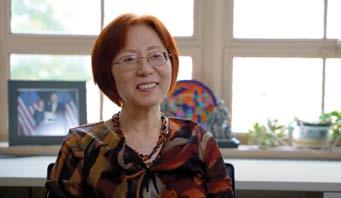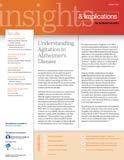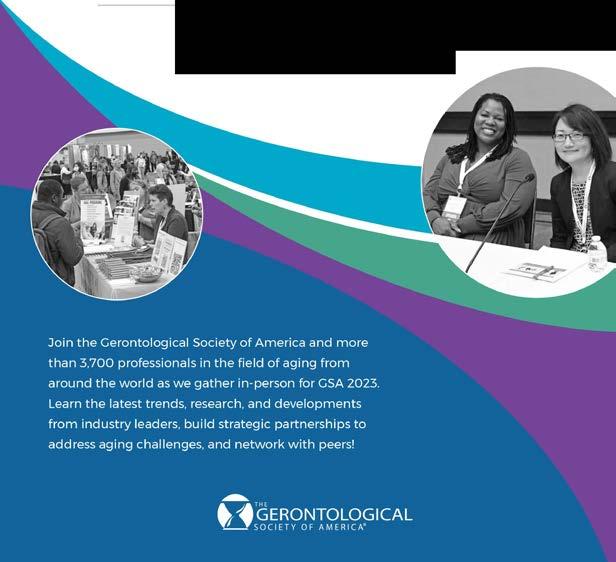GSA Deepens Its Commitment to Minority Aging Research
By James Appleby, BSPharm, MPH • jappleby@geron.org
As seen on the cover of this issue, I hope you will join me in celebrating the news that GSA has been awarded a five-year grant to serve as the National Coordinating Center (NCC) for the National Institute on Aging (NIA) Resource Centers for Minority Aging Research (RCMAR) program! Now entering its 26th year of continuous funding, it’s the Division of Behavioral and Social Research’s flagship infrastructure and mentoring program for scientists from diverse backgrounds, including but not limited to, individuals from underrepresented groups who conduct behavioral and social research focused on aging, health disparities of older adults, and Alzheimer’s disease and related dementias (AD/ADRD).
The role of the NCC aligns perfectly with GSA’s core strengths of being a convener, connector, collaborator, communicator, and catalyst. This five-year award is just under $4 million, making it the largest NIA grant the Society has received. And importantly, the “U” funding mechanism is a collaborative agreement enabling GSA to work in close partnership with NIA to implement the comprehensive portfolio of programs described in the Society’s successful proposal.
GSA Vice President of Policy and Professional Affairs Trish D’Antonio, BS Pharm, MS, MBA, BCGP, will be stepping into the role of contact principal investigator (PI) for the NCC, in collaboration with PIs Tamara Baker, PhD, MA, FGSA; Lisa Barnes, PhD, FGSA; and GSA Treasurer Carmen Castañeda Sceppa, MD, PhD, FGSA. I also express my thanks to the prior directors of the NCC, Lourdes R. Guerrero, EdD, MSW, and Nadereh Pourat, PhD. The new team is fortunate to be able to build upon the robust foundation they have established. And we look forward to working with the many scholars who are directing or are affiliated with RCMAR centers across the country.
Serving as home to the RCMAR NCC builds on GSA’s long-standing commitment to minority issues in aging. The GSA Minority Issues in Gerontology Advisory Panel (originally established in 1987 as the Task Force on Minority Issues in Gerontology) reports directly to the Board of Directors and has produced many well-received publications. The highly successful Minority Leadership Development Program was reestablished in 2018 as the GSA Diversity Mentoring and Career Development Technical Assistance Program. GSA continues to provide Annual Scientific Meeting attendees with a special listing of all minority aging related research presentations at the conference, a practice in place for the past 35 years. GSA has elevated, as one of its top awards, the James Jackson Outstanding Mentorship Award presented to an individual who has exemplified outstanding dedication to mentoring minority researchers in the field of aging. GSA provides graduates of the NIA Butler-Williams Scholars Program (a program of the NIA Office of Special Populations) with a complimentary one-year membership to support their career growth. And the NIA Advancing Diversity in Aging Research through Undergraduate Education program conducts its annual summit meeting at the GSA conference each November.
The RCMAR NCC PIs have developed an ambitious and comprehensive portfolio of programs to support all RCMAR Centers, working in close collaboration with the NIA. This work will enhance the prominence of the RCMAR program and bolster behavioral and social research on aging and AD/ADRD throughout and beyond the aging field.
This is a milestone moment for your Society, and I proudly applaud all the members whose work on minority aging provided us with the knowledge base to pick up the torch and elevate the new NCC alongside NIA, the largest supporter of aging research in the world.
editor-in-chief/lead author: Todd Kluss tkluss@geron.org

managing editor: Karen Tracy ktracy@geron.org
associate editor: Megan McCutcheon mmccutcheon@geron.org
circulation worldwide: 5,000
letters to the editor: We will publish letters to the editor in response to issues raised in the newsletter. Please limit letters to no more than 350 words. Letters should include the writer’s full name, address, and telephone number. Letters will be accepted or rejected at the sole discretion of the editors and may be edited for clarity or space. Send to: tkluss@geron.org
Gerontology News (ISSN 1083 222X) is published monthly by The Gerontological Society of America, 1101 14th Street NW, Suite 1220, Washington, DC 20005 and additional mailing offices. Subscription for members of the Society is included in annual dues. News items must be submitted by the first of the month prior to publication.
Copyright © 2023 by The Gerontological Society of America. Articles may be photocopied for educational purposes without permission. Please credit Gerontology News.
Send news items to: tkluss@geron.org
Send advertisements to: advertising@geron.org
Ad rates are available at www.geron.org
Advertising policy:
Gerontology News accepts ads for conferences and special events, fellowships, jobs, and degree programs relevant to the field of aging. We reserve the right to reject or discontinue any advertising. Ads do not constitute an endorsement by The Gerontological Society of America.
Volume 51, Issue 9, September 2023 gerontology news 2 • September 2023 • gerontology news
In Memoriam
Jordan Irving Kosberg, PhD, FGSA, FAGHE, passed away on June 16 at age 83. A gerontological social work researcher and educator, he held positions at California State University, Florida State University, Case Western Reserve University, University of South Florida, McGill University (where he held an endowed chair position), Florida International University, and the University of Alabama (where he held an endowed chair position and was awarded emeritus professor after his retirement in 2010).
Kosberg also held an honorary appointment as adjunct professor in the Division of Geriatrics at the University of New Mexico (2010 to 2013) and visiting professor in Highland University’s School of Social Work (2010 to 2012).
During his academic career, he held visiting professorships in China, Hong Kong, Australia, and Israel, and was named the Tower Fellow for the New Zealand Institute for Research on Aging in 2002. He was awarded the Career Achievement Award in 2000 by GSA’s Academy for Gerontology in Higher Education, and the Rosalie Wolf International Award in 2011 by the International Network for the Prevention of Elder Abuse.
Members in the News
• Susan Reinhard, PhD, FGSA, and Donna Benton, PhD, were quoted in a July 18 NPR article titled “‘Hospital-at-home’ trend means family members must be caregivers — ready or not.”
• On July 25, Deborah Carr, PhD, FGSA, co-authored a piece for The Conversation titled “Extreme heat is particularly hard on older adults – an aging population and climate change put ever more people at risk”; it was picked up by several other outlets, including The Los Angeles Times
Member Spotlight
GSA’s website features monthly Q&A sessions with distinguished members. The current spotlight shines on: Joel L. Olah, MA, PhD
Member Referral Program
This month’s $25 Amazon gift certificate winner: Sarah L Szanton, PhD, RN, FAAN, FGSA
The recipient, who became eligible after referring new member Wei-Chen Lee, PhD was randomly selected using randomizer.org. For more details on the Colleague Connection promotion visit www.geron.org/connection.
Perry Earns Social Work Award
The Special Commission to Advance Macro Social Work has presented its Rothman Award for Structural Change Practice to GSA board member-elect Tam Perry, PhD, FGSA. This distinction recognizes transformative change in the way policies and procedures are carried forward and/or by whom. Such change alters conditions to benefit people suffering inequities, such as poverty and income deprivation, racial injustice, and social discrimination.
Perry is current a professor of social work and training director for the Institute of Gerontology at Wayne State University. Throughout her career, she has worked closely with community organizations, local and federal funders, and older adults, completing a variety of ethnographic research projects integrating first-hand accounts of how older adults are impacted by housing instability and transitions, homelessness, loss, caregiver death, environmental impacts, and more.
Clark-Shirley Appointed to Top ASA Post
On July 27, the American Society on Aging appointed Leanne Clark-Shirley, PhD, FGSA, as the organization’s interim president and CEO, effective September 1. Clark-Shirley currently serves as ASA’s first chief gerontology officer and has been with ASA since June 2020.
She is a social gerontologist with nearly 20 years of experience working in aging-related nonprofit, consulting, and academic environments. Before joining ASA, she was AARP’s senior evaluation advisor, responsible for strategic planning, building internal evaluation research capacity, and applying impact measurement expertise at the departmental and enterprise levels. Prior to that, she led the aging and disability research practice at IMPAQ International, a think-tank and policy research firm.
Teaster, Reed Named as Health and Aging Policy Fellows
Pamela B. Teaster, PhD, MA, MS, FGSA, FAGHE, and Nicholas S. Reed, AuD, PhD, are among those selected for the newest class of the Health and Aging Policy Fellows Program. The fellows are comprised of health and aging professionals from various fields of work. The year-long fellowship offers a rich and unique training and enrichment program that is focused on current policy issues, communication skills development, and professional networking opportunities to provide fellows with the experience and ability to help affect policy.
Reed is an assistant professor in the Department of Epidemiology at the Johns Hopkins University Bloomberg School of Public Health, and has a joint appointment in the Department of Otolaryngology-Head and Neck Surgery (Audiology) at the Johns Hopkins School of Medicine. Teaster is a professor and director of the Center for Gerontology at Virginia Tech.
de Cabo, Xu Receive AFAR Awards
The American Federation for Aging Research (AFAR) has named Rafael de Cabo, PhD, FGSA, as the recipient of its 2023 Irving S. Wright Award of Distinction and Ming Xu, PhD, as the recipient of its 2023 Vincent Cristofalo Rising Star Award in Aging Research.
The Wright award is named in honor of AFAR’s founder and recognizes exceptional contributions to basic or clinical research in the field of aging. de Cabo is the senior investigator of the Experimental Gerontology Section and chief of the Translational Gerontology Branch at the National Institute on Aging. His research has focused on improving understanding of the molecular mechanisms underlying the effects of caloric restriction on aging and pharmacological interventions for healthy aging.
The Cristofalo award is named in honor of a late past GSA president who dedicated his career to aging research and to encouraging young scientists to investigate important problems in the biology of aging. Xu is an assistant professor at the UConn Center on Aging and the Department of Genetics & Genome Sciences at UConn Health. His research focuses on cellular senescence.
The awards will be presented at GSA’s 2023 Annual Scientific Meeting, where the recipients will each present a lecture.
September 2023 • gerontology news • 3 member news
By GSA Policy Advisor Brian W. Lindberg, MMHS
Tampa Brings New Round of Policy Series Offerings
It is that time of year when I entice GSA members to attend the Annual Scientific Meeting’s Public Policy Series. Yes, it is still a couple of months away, but by now you have made your plans to attend the meeting in Tampa and will be excited to read about some of the excellent sessions planned by your colleagues and GSA staff. This whole in person meeting thing is just so wonderful and plays a part in sparking innovation and collaboration throughout the year. It will be great to see you in Tampa!
Please consult the meeting program for any schedule updates.
Wednesday, November 8
Health and Aging Policy Fellows: Linking Policy and Practice to Benefit Older People
10:30 a.m. to 12 p.m. in Tampa Convention Center Room 109
Chair: Maureen Henry
Panelists: Emily Franzosa, Jonathan Cohen, Maria Carney, Benjamin Springgate, Nancy Kusmaul, Brystana Kaufman,
Discussant: Brian W. Lindberg
In this seminar, current and past Health and Aging Policy Fellows from medicine, research, social work, and law will describe what they learned through the training and placement in a policy role, how viewing health and aging through a policy perspective changed their understanding of systems, and how they think the fellowship will enable them to influence policy to improve the lives of older people in the future.
Emerging Scholar and Professional Organization and Social Research, Policy, and Practice Section Symposium: Law as a Determinant of Health: A Social Justice Lens to Impactful Policy Engagement
12:30 to 2 p.m. in Tampa Convention Center Room 109
Chair: Sara Bybee
Co-Chair: Kexin Yu
Panelists: Lindsay Smith, Patricia D’Antonio
Discussant: Rita Choula
While the U.S. has long recognized that social determinants such as housing, access to medical care, and neighborhood safety contribute to health outcomes, there has been little attention on more upstream factors. Political determinants of health refer to laws and policies that can inequitably distribute resources which creates structural barriers to equity for population groups that lack power and privilege. In this symposium, speakers will discuss their research into the health-harming effects of laws and policies that disproportionately affect people of color and older adults. This session is intended for all audiences who want to learn more about political and structural determinants and become more involved in addressing these policies.
Strategies to Frame our Public Policy Work
2:30 to 4 p.m. in Tampa Convention Center Room 109
Chair: Patricia D’Antonio
Co-Chair: Julie Schoen
Panelist: Julie Ober Allen
Discussant: Hannah Albers
Our words and the way we harness their power matter when we advocate for age inclusive policies like the Older Americans Act (OAA). Since 1965, the OAA has supported our nation’s infrastructure of community-based social services. In 2024, the OAA will be up for reauthorization. Join the National Center to Reframe Aging and the National Center on Elder Abuse as we use the OAA reauthorization to show how we can apply communication strategies to support policy change.
Thursday, November 9
A Secure Retirement for Older Women
8 to 9:30 a.m. in Tampa Convention Center Room 109
Chair: Brian w. Lindberg
Co-Chair: Cindy Hounsell
Panelist: Hector Ortiz
This session will address policy developments related to women’s financial well-being in later life, including the recently passed SECURE 2.0, financial literacy, healthcare workforce-related issues, and the role of the Consumer Financial Protection Bureau in protecting older adults from fraud and exploitation.
Aging and Health Policy Update: A View from Washington
12 to 1:30 p.m. in Tampa Convention Center Room 109
Chair: Brian Lindberg
Panelists: Andrew MacPherson, Bob Blancato, and others
Discussant: Patricia M. D’Antonio
Leading policy advocates will present their findings and viewpoints regarding aging and health care policy during a divided Congress. Issues will include behavioral health, social isolation, health care workforce, telehealth, hospice policy, elder justice and nursing home care, home and community-based services, and Medicare and Medicaid.
Building Trust, Addressing Burnout and Expanding the Direct Care Workforce: 2022 Report to DHSS and Congress
4:30 to 6 p.m. Tampa Convention Center Room 109
Chair: Naushira Pandya
Panelists: Joan Weiss
Discussant: Brian W. Lindberg
This symposium will review the key points and recommendations of the 2022 report to the Secretary of the Department of Health and Human Services and Congress. Discussions will address clinician burnout following the Covid-19 pandemic, erosion of patient trust in the public healthcare system, and the enhanced role of community health workers as the future primary care workforce.
Friday, November 10
Let’s Connect: Linking Research to Policy in Family Caregiving
8 to 9:30 a.m. Tampa Convention Center Room 109
Chair: Lauren Bangerter
Co-Chair: Michael Wittke
Panelists: Ranak Trivedi, Beth Fields, Heidi Donovan
policy news 4 • September 2023 • gerontology news
Discussant: Fawn Cothran
Goal five of the RAISE National Family Caregiver Strategy calls for a stronger research and data collection infrastructure. This session will explore ways to facilitate improved collection of a range of caregiver data, including family caregivers of people with multiple conditions, disaggregating data on diverse family caregiver populations to address the lack of segmentation and intersectionality in family caregiver research, family caregiver health conditions and risk factors, and constructing additional channels on the local level that can gather detailed patient and family caregiver experience.
The Moving Forward Nursing Home Coalition: Nursing Home Reform and the Residents’ Goals, Preferences, and Priorities
10 to 11:30 a.m. Tampa Convention Center Room 109
Chair: Tara McMullen
Co-Chair: Tetyana Shippee
Panelists: Tonya Roberts, Alice Bonner, Gregory Alexander
Discussant: Howard Degenholtz
The 2022 National Academies of Sciences, Engineering, and Medicine report called for nursing facilities to provide “care aligned to the individual’s goals and preferences.” Three committees from the Moving Forward Nursing Home Coalition will present work focused on the development of a standardized goals, preferences, and priorities (GPP) care planning process to enhance the identification, documentation, communication, and implementation of resident GPPs, the measurement of the care planning process to support process improvement, and the creation of a HIT-enabled process to measure the concordance of care provided with an individual’s GPPs. This is a collaborative symposium between the following GSA Interest Groups: Aging Workforce, Hospital Elder Life Program, Measurement, Statistics, and Research Design, Systems Research in Long Term-Care, and Technology and Aging.
GSA Congressional Update
12 to 1:30 p.m. Tampa Convention Center Room 109
Chair: Patricia D’Antonio
Co-Chair: Brian W. Lindberg
Panelists: Staff of the U.S. Senate and House of Representatives, and aging advocates
This popular annual session will provide cutting-edge information on what the 118th Congress has and has not accomplished to date related to aging policy, and what may still come to pass by the end of the year.
Interdisciplinary Public Policy Discussion Session
4:30 to 6 p.m. Tampa Convention Center Room 109
Chair: Patricia D’Antonio
Co-Chair: George Taffet
Panelist: Carol Shively, Raya Kheirbek, Joann Montepare, Kexin Yu, Jim Lubben
Discussant: Brian W. Lindberg
This interactive session organized by the GSA Public Policy Committee will provide GSA section leadership and attendees with an opportunity to have an open dialogue on the impact of social isolation and loneliness. The panelists represent the six member groups of GSA.
Saturday, November 11
Presidential Symposium: Impact of Discriminatory Policies on LGBTQ+ Older Adults’ Health and Well-Being and How to Combat Them
8 to 9:30 a.m. Tampa Convention Center Room 109
Chair: Jung Kwak
Panelists: Em Balkan, Rajean Moone, Nik Lampe
Discussant: Karen Fredriksen-Goldsen
This symposium explores the implications of discriminatory policies on the health, housing, and economic well-being of LGBTQ+ older adults, and solutions for promoting empowerment, equity, and inclusion throughout the care continuum, from longterm services and supports to end-of-life care.
Public Health and Aging Policy: Experience of 2023 GSA Summer Policy Interns
12 to 1:30 p.m. in Tampa Convention Center Room 109
Chair: Patricia D’Antonio
Panelists: Alisha Thompson, Bailee Brekke, Christina Mu
Discussant: Brian W. Lindberg
GSA is home to an established summer policy internship program named in memory of Kathryn Hyer and Greg O’Neill, who were policy scholars and long-time GSA members. Interns will share the impact of their experiences on their research and future career goals in gerontology.
Are We There Yet? Measuring Progress in Achieving Policy Goals for Family Caregivers
3:30 to 5 p.m. in Tampa Convention Center Room 109
Chair: Pamela Nadash
Panelists: Susan Reinhard, Michael Wittke, Salom Teshale, Eileen Tell
Discussant: Rani Synder
The RAISE Family Caregiving Advisory Council published its National Strategy to Support Family Caregivers in 2022. One key concern identified by advocates and others is the accountability question: how can we hold policymakers at all levels of government accountable for achieving the policy goals articulated in the National Strategy? This symposium discusses that issue by providing an overview of current mechanisms and ideas for future progress.
Doctoral Programs in Gerontology: Providing Leadership in Policy and Aging
5:30 to 7 p.m. in Tampa Convention Center Room 109
Chair: Edward Miller
Panelists: Lindsay Peterson, Kathleen Wilber, Jennifer Kinney
Discussant: Brian Kaskie
Public policy offers one of the most effective ways to address workplace discrimination, displacement, and impoverishment, public health inequalities pertaining to disease and disability, isolation, and vulnerability among older adults, and other issues of population aging. Programs at the University of Massachusetts Boston, University of South Florida, University of Southern California, and Miami University offer classroom education, research, and service-learning opportunities for students to acquire expertise in aging and public policy.
Continued policy news
September 2023 • gerontology news • 5
Continued
from
page
1 - Publication Addresses Management of Agitation in Alzheimer’s Disease
The faculty who oversaw the publication’s development include George T. Grossberg, MD, and Angela Sanford, MD, CMD, of Saint Louis University School of Medicine; Ann Kolanowski, PhD, RN, FGSA, FAAN, of Penn State University; Laura Medders, LCSW, of Emory Integrated Memory Care; and Susan Scanland, MSN, CRNP, GNP-BC, CDP of Dementia Connection, LLC.
Grossberg emphasized that a person-centered approach to care is central to the management of AAD.
“In a person-centered care culture, agitation behaviors are viewed as clues to the presence of distress in a person who is no longer able to communicate an issue through other means,” he said. “The goal of care should be to consider: ‘What is this person expressing, what is causing this reaction, and how can we respond to reduce their distress?’ rather than ‘How do we manage this behavior?’”
In addition to behavioral approaches that may be implemented by caregivers and the person’s care team, the management of AAD may include specific nonpharmacologic modalities such as music or therapeutic touch or pharmacologic approaches. In May 2023, brexpiprazole became the first medication to be approved by the U.S. Food and Drug Administration for the treatment of agitation associated with dementia due to Alzheimer’s disease. Medications used off-label
DUAL-TITLE PhD IN GERONTOLOGY
The Gerontology Program of the Center on Aging and the Life Course at Purdue University
Combine a doctoral program of disciplinary depth with interdisciplinary breadth in gerontology to achieve the most useful credential in the field.
Earn the dual-title PhD in gerontology and one of the following fields:
• Anthropology
• Communication
• Health & Kinesiology
• Human Development & Family Studies
• Nursing
• Nutrition Science
• Pharmacy Practice
• Psychological Sciences
• Sociology
• Speech, Language, & Hearing Sciences
CONTACT: Hui (Cathy) Liu, PhD Director, Center on Aging and the Life Course calc@purdue.edu • purdue.edu/aging
to treat AAD have included benzodiazepines, antihistamines, antidepressants, antiepileptics, and antipsychotics. These agents are limited by only moderate efficacy and most have serious safety and tolerability concerns that are often increased in elderly populations.
Grossberg and his colleagues have developed a treatment algorithm for interventions to ameliorate and prevent agitation that supports the implementation of the International Psychogeriatric Association definition in practice — and is built around a person-centered framework. This decision tree for guiding the management of AAD outlines several steps that should be followed for assessing and managing AAD, starting with ongoing assessment for the emergence of symptoms, differential diagnosis, and nonpharmacologic and pharmacologic treatment approaches.
“Insights & Implications in Gerontology: Agitation in Alzheimer’s Disease” highlights these developments and provides details about person-centered behavioral approaches to AAD, including strategies for care planning, goal setting, and caregiver collaboration. It also provides a framework for how to incorporate other treatment modalities and offers perspectives from clinicians with experience treating patients with AAD. Support for this publication was provided by Otsuka.
newsletter reaches


5,500 members both in print and online.
Gerontology News accepts ads for conferences and special events, fellowships, jobs, and degree programs relevant to the field of aging.

6 • September 2023 • gerontology news
EA/EOU ADVERTISE WITH US! See the current
www.geron.org/advertising. This
rates at
GSA’s
Get to Know Your Junior Leaders: Behavioral and Sciences Section
 By Sara E. Hackett, PhD and Iggy E-Shien Chang, PhD
By Sara E. Hackett, PhD and Iggy E-Shien Chang, PhD

Greetings, Behavioral and Social Sciences (BSS) Section ESPO Members!
We are proud to have the opportunity to serve as your 2023 junior section leaders. If you are brand new to GSA or to the BSS Section, welcome! We are happy to have you with us!
Your BSS section leadership has been very hard at work this year. Much of our efforts to this point have revolved around preparing for the Annual Scientific Meeting (ASM). As you may know, BSS continued to lead the way in abstract submissions, with our membership accounting for nearly half of all submissions! If you submitted an abstract or helped with the review process, thank you! Each one of you contributes to making GSA the premier society on aging that it is, and we are grateful for your dedication and the many talents that you share with us year-round.
Building on this sentiment, GSA is truly our society, and BSS leadership firmly believes that each member (whether you are brand new to us or whether you have been with us for a bit) has something invaluable to offer. As such, we are constantly striving to learn from each other and to develop new and innovative ways to collaborate with and engage our rich and diverse membership. Along this line, we want to take this opportunity to share some of the exciting activities that BSS leadership has planned for members in the next few months. We hope that you will take the time to learn about these special events and maybe more importantly, that you will take advantage of them!
The first event we want to share is a webinar that we are hosting in concert with the Loneliness and Social Isolation Interest Group. During this informative webinar, our expert panelists will identify priority research areas to advance intergenerational programs to reduce social isolation and loneliness. This session is scheduled for Wednesday, September 27, from 12 to 1 p.m. ET and registration
information will be available soon. The second event we want to draw your attention to is the virtual BSS Sneak Peek to the ASM. The purpose of this pre-meeting session is to help orient members to GSA and to provide members with the chance to network prior to the ASM. During this meeting, participants will be joined by BSS and ESPO Presidential Symposia speakers who will: offer a sneak peek of their upcoming ASM presentations; give advice on how to get the most out of the ASM; and answer questions for those preparing for in-person conference going. This session is not to be missed as it is sure to provide a welcoming atmosphere where BSS members can reconnect, meet new colleagues, and learn helpful strategies for navigating the upcoming ASM. This meeting will take place in October and specific details about the date and registration are forthcoming — so stay tuned!
Last but not least, if you are attending the ASM in Tampa, be sure to join us at BSS’s Recognition and Networking session on Thursday, November 9 from 1:45 to 3:15 p.m. ET. This event is always a highlight of the ASM and is a wonderful opportunity to celebrate the contributions of and connect with our wonderful colleagues in BSS. To attend, you can register for this session at the time you complete your registration for the ASM. Alternatively, if you have already registered for the ASM, you can login and edit your registration to add this event. Again, thank you for allowing us to serve you this year. If you have ideas or feedback about events you would like to see from the BSS section, please feel free to reach out to us on GSA Connect. We will also use the GSA Connect platform to disseminate information about additional exciting events sponsored by BSS so make sure to follow our posts. Take great care and we look forward to joining you at these sessions and the ASM!
“Based at GSA, the RCMAR National Coordinating Center will draw upon the Society’s well-established infrastructure and leverage its deep expertise in coordinating complex activities, convening large and small meetings, collaborating with colleague organizations and diverse stakeholders, catalyzing synergistic and diverse research products, and communicating within and beyond the aging field through its peer-reviewed journals and publicoriented programs,” D’Antonio said.
The mission of the National Coordinating Center is to provide support and coordination to RCMAR centers and AD/ADRD RCMAR centers, and cofunction with NIA and the RCMAR enterprise to bolster the mentorship and career development of researchers from diverse backgrounds and foster rigorous behavioral and social science research in aging, health disparities, equity, and AD/ADRD.
“GSA’s portfolio of programs, activities, and dissemination vehicles provides a unique and valuable platform for building a strong and thriving National Coordinating Center,” Appleby said. “GSA brings to bear this same comprehensive resource base to support the efforts of the National Coordinating Center, which will extend the dissemination of RCMAR center activities to the broader scientific research community, the media, the corporate sector, policy experts, decision-makers, and the public.”
The RCMAR National Coordinating Center is supported by the National Institute on Aging, part of the National Institutes of Health under Award Number U24AG083253. The content is solely the responsibility of the authors and does not necessarily represent the official views of the National Institutes of Health or the National Institute on Aging.
September 2023 • gerontology news • 7
espo news
The Emerging Scholar and Professional Organization includes all student and transitional members of GSA.
Hackett Chang
Continued from page 1 - GSA Tapped to Lead RCMAR National Coordinating Center
CONGRATULATIONS TO THE 2021 RECIPIENT:
NAMKEE G. CHOI, PHD, FGSA, THE UNIVERSITY OF TEXAS AT AUSTIN

Maxwell A. Pollack Award for Contributions to Health Aging
The Award recognizes an individual whose research, scholarship or practice has generated new or improved policies or practices related to healthy aging.
Nominations are accepted in the spring of every year. Scan this code for more information.


CONGRATULATIONS TO THE 2022 RECIPIENT:
NANC Y MORROW-HOWELL, MSW, PHD, FGSA, WASHINGTON UNIVERSITY IN ST. LOUIS
Maxwell A. Pollack Award for Contributions to Health Aging
The Award recognizes an individual whose research, scholarship or practice has generated new or improved policies or practices related to healthy aging.

8 • September 2023 • gerontology news
This award is funded by The New York Community Trust through a generous gift from Maxwell A. Pollack Fund
the Pollack Award Lecture at GSA 2023. www.gsa2023.org
This award is funded by The New York Community Trust through a generous gift from Maxwell A. Pollack Fund
Make sure to attend
Quashie Joins Series as Associate Editor
The Social Sciences section of The Journals of Gerontology, Series B: Psychological Sciences and Social Sciences has announced the appointment of Nekehia T. Quashie, PhD, as a new associate editor on the editorial team. Quashie, a sociologist and population health scholar, is currently an assistant professor in the Department of Health Studies at the University of Rhode Island. She said she hopes to expand the international impact of the journal with her significant expertise on aging within and across global regions of Latin America and the Caribbean, Asia, and Europe. She brings a broad understanding of the role of social welfare policies and socioeconomic inequality in family dynamics in these contexts. Some of her ongoing research examines topics of childlessness, partnership quality, living arrangements, and caregiving in relation to later life health and well-being. She is also an editorial board member and regional liaison for Latin America and the Caribbean with the Journal of Global Ageing and co-leads the monthly co-writing groups of GSA’s Emerging Scholar and Professional Organization.

Series A Welcomes Papers on Dementia and Population Health Trends
The TRENDS Network at the University of Michigan intends to publish a potential supplement issue on “Multidisciplinary Perspectives on Dementia and Population Health Trends” for the Medical Sciences Section of The Journals of Gerontology, Series A: Biological Sciences and Medical Sciences. Papers for publication will be accepted from a broad array of scientific disciplines, including those within public health, the social sciences, and the clinical sciences. Priority areas of interest include:
• Leveraging of national health surveys (e.g., Health and Retirement Study, National Health and Aging Trends Study) or large-scale electronic health records/medical claims to understand trends in dementia or dementia care in the United States.
• International comparisons of dementia or dementia care trends.
• COVID-19 and dementia or dementia care trends.
• Interrelations between changing family demography and future care for older adults with dementia.
The University of Michigan is sponsoring this supplement issue with support from the National Institute on Aging. Access full details at bit.ly/GSA-CFP. Manuscripts are due October 1.
The Gerontologist Issues Call for Papers on Homelessness
The Gerontologist is soliciting papers for a forthcoming issue on “Homelessness and Aging.” The journal will consider a broad range of topics given that late life homelessness includes a range of unsafe and unstable situations for persons aged 50
years and older, including individuals and families who lack or will imminently lose a fixed, regular, and adequate nighttime residence as well as older people fleeing or who are attempting to flee violence.
This call for papers encourages submissions that continue to document the impact of homelessness on older populations, especially those that address intersections of precarity, including health disparities, race/ethnicity, gender, country of origin, and aging. The editors also encourage research on innovations and solutions as well as the development of theoretical and conceptual perspectives. Abstracts are due October 1.
Series A Extends Deadline for Special Issue on Complex Systems Dynamics
The Biological Sciences and Medical Sciences sections of The Journals of Gerontology, Series A: Biological Sciences and Medical Sciences have extended the submission deadline for a joint special issue on “Complex Systems Dynamics and the Aging Process.” Manuscripts are now due November 1. The editors state:
“There are numerous opportunities to use the extensive complex systems toolboxes that have been developed in other fields, complemented by new methods in bioinformatics and systems biology, to measure, monitor, and ultimately improve the process of aging. We are also interested in the application of complexity science to clinical geriatrics, whether it be in heart rate variability or the emergence of frailty. Together, there is now the possibility to start to regard aging processes at all levels — from molecular to organismal to societal — as products of complex systems dynamics. In this context, we invite articles for this collection that shed light on how aging relates to these dynamics.”
Topics of interest include, but are not limited to fundamental research in aging, including animal, cell, tissue, and computational studies; and translational aging research, including (patho) physiologic, epidemiological, clinical, and computational studies.
Series A Introduces Section on Geroscience
The Journals of Gerontology, Series A: Biological Sciences and Medical Sciences is welcoming papers for a new recurring section dedicated to translational geroscience Topics that will be considered include but are not limited to biological determinants of health and disparities in aging; populations for geroscience: high and low burdens of functional deficits and morbidities; multimorbidities and geriatric syndromes; methods for measuring health; mathematical modeling of aging and health for geroscience; biomarkers for geroscience; geroscience as medicine in the clinic and community; and eroscience clinical trials.
There is no deadline for translational geroscience section submissions.
journal news September 2023 • gerontology news • 9
Quashie






 By Sara E. Hackett, PhD and Iggy E-Shien Chang, PhD
By Sara E. Hackett, PhD and Iggy E-Shien Chang, PhD






 By Laura K.M. Donorfio, PhD, FAGHE, and Tina M. Newsham, PhD, FAGHE
By Laura K.M. Donorfio, PhD, FAGHE, and Tina M. Newsham, PhD, FAGHE



